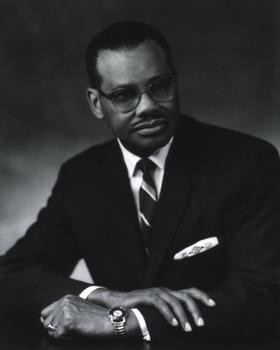Leonidas Berry facts for kids
Quick facts for kids
Leonidas Harris Berry
|
|
|---|---|
 |
|
| Born | 20 July 1902 |
| Died | 4 December 1995 (aged 93) |
| Nationality | American |
| Alma mater | Wilberforce University University of Chicago Rush Medical College University of Illinois Medical School |
| Scientific career | |
| Fields | Gastroscopy, Endoscopy |
| Institutions | National Medical Association |
Leonidas Harris Berry (born July 20, 1902 – died December 4, 1995) was an important American doctor. He was a pioneer in using special tools to look inside the human body. These tools are used in procedures called gastroscopy and endoscopy. He also led the National Medical Association from 1965 to 1966.
About Leonidas Berry
Leonidas Berry was born in Woodsdale, North Carolina. His family had a strong history. His ancestors fought for freedom during the Civil War.
He went to Wilberforce University and graduated in 1924. After that, he moved to Chicago. There, he earned another degree from the University of Chicago. He then received his medical degree from the Rush Medical College. In 1933, he also earned a master's degree in Pathology. This is the study of diseases.
After becoming a doctor, Berry worked at hospitals in Washington, D.C., and Chicago. He became an expert in gastroenterology. This field focuses on the stomach and intestines. He worked at Cook County Hospital until he retired in 1975. He was the chief of endoscopy there. He also worked at Michael Reese Hospital and Provident Hospital.
Besides his medical work, Dr. Berry was a teacher and writer. He also helped his community. He worked on civil rights issues. He wrote a book about his family's history. It was called I Wouldn't Take Nothin' For My Journey.
Fighting for Fairness
Dr. Berry was a medical pioneer and also a social activist. He fought for fairness and equality. In 1958, a medical meeting was planned in New Orleans. At that time, there was still racial segregation in the city. This meant Black people were kept separate from white people.
Dr. Berry decided not to go to the meeting. He wrote a letter to the organizers. He asked them to take a stand against segregation. He believed it was wrong.
In 1965, Dr. Berry became the president of the National Medical Association (NMA). The NMA was started in 1895. Its goal was to fight against unfair treatment in medicine. This included medical societies, schools, and hospitals.
During his time as president, Dr. Berry worked to bring people together. He wanted to end segregation within the NMA itself. He invited white doctors to join the organization. By 1966, one hundred white doctors had joined.
Because of his efforts, the American Medical Association (AMA) also changed. In 1968, the AMA agreed to stop its unfair racial practices. Dr. Berry also helped create a special committee. This committee worked to end racial discrimination in hospitals. It pushed the AMA to make healthcare fair for everyone.
Dr. Berry also cared deeply about young people. In 1950, he helped start the Chicago Council for Biomedical Careers. This group helped Black American youth learn about medical careers. They offered advice and resources. They also held health conferences.
He wanted to make sure everyone had access to medical care. This led him to start the "Flying Black Medics" project. On February 15, 1970, Dr. Berry and other medical professionals flew to Cairo, Illinois. Cairo was experiencing a race riot at the time. But this did not stop them.
They set up a clinic in a church basement. They gave out supplies and examined patients. They also gave lectures on health. They talked about how to improve healthcare for people in need.
Dr. Berry believed doctors should help their communities. He fought against unfair treatment in healthcare. His dedication to justice was a big part of his life and career.
Awards and Recognition
Dr. Leonidas Berry received many awards for his important work:
- The Rudolph Schindler Award in 1977. This was from the American Society for Gastrointestinal Endoscopy.
- A Distinguished Service Award from the National Medical Association.
- The First Annual Clinical Achievement Award from the American College of Gastroenterology.
- The Freedom Award for Public Service from the Chicago Chapter of the NAACP.
- The Distinguished Alumni Award from Rush Medical College.
 | Chris Smalls |
 | Fred Hampton |
 | Ralph Abernathy |

